小升初--一般现在时英语课件 全国通用(30张PPT)
文档属性
| 名称 | 小升初--一般现在时英语课件 全国通用(30张PPT) |  | |
| 格式 | pptx | ||
| 文件大小 | 4.6MB | ||
| 资源类型 | 教案 | ||
| 版本资源 | 通用版 | ||
| 科目 | 英语 | ||
| 更新时间 | 2021-02-05 08:26:21 | ||
图片预览


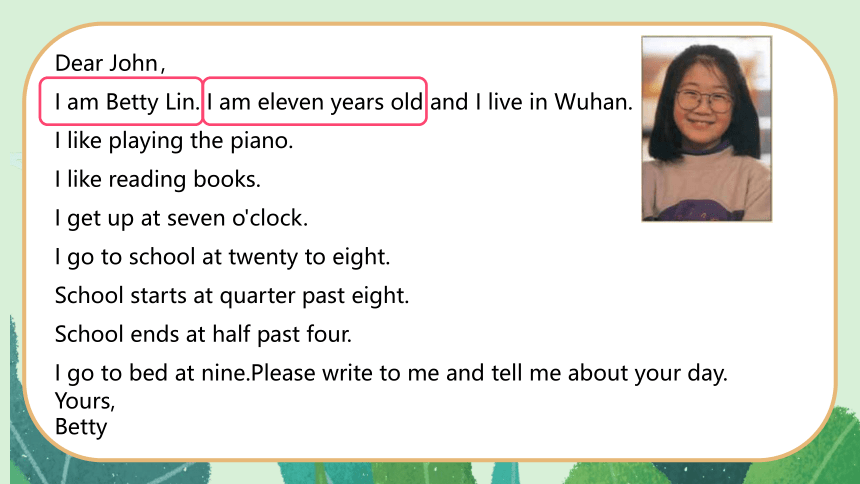
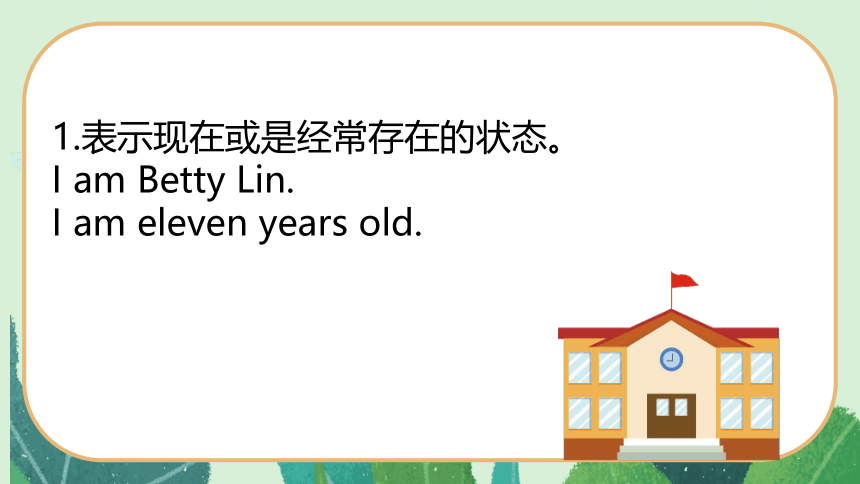
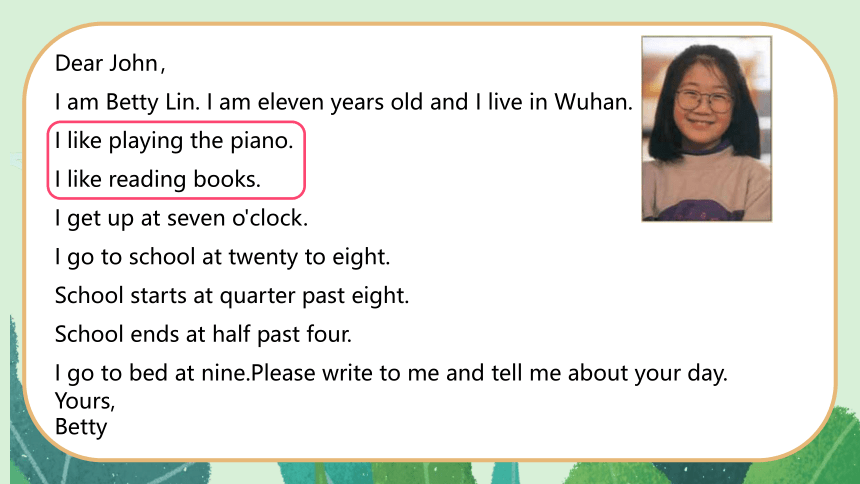
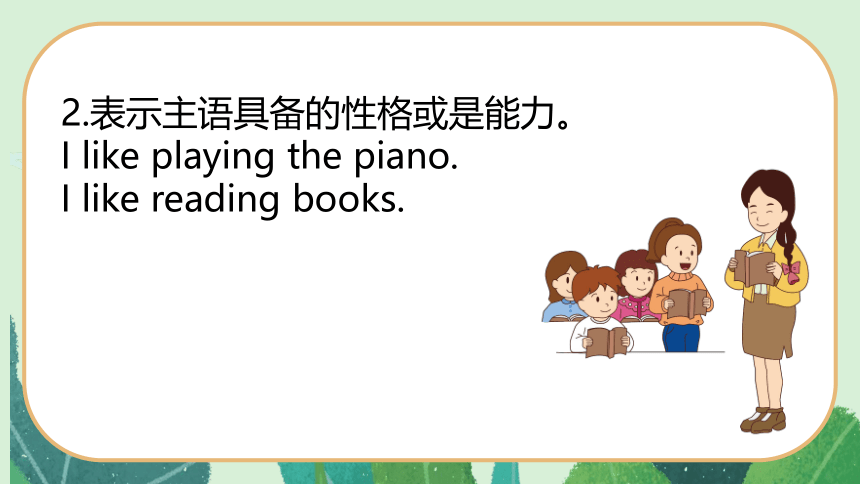
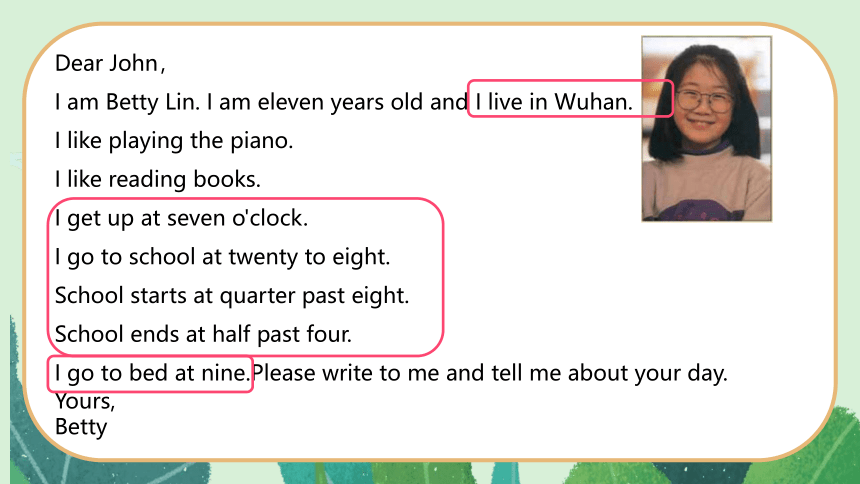
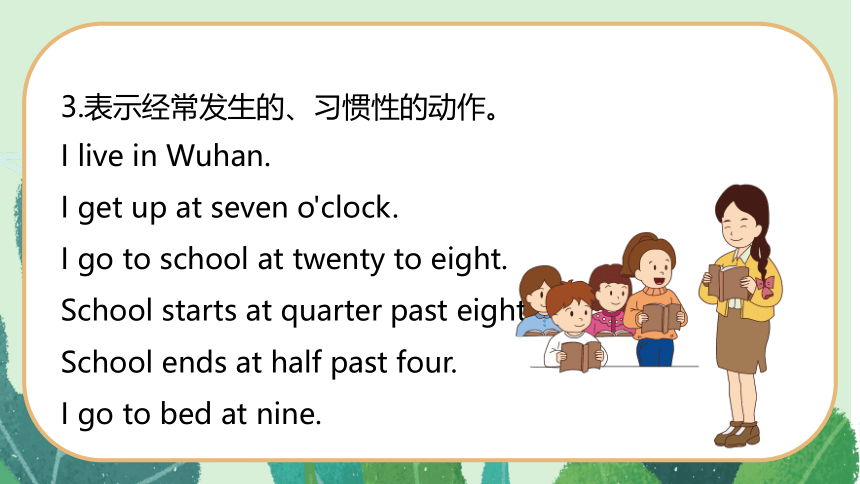

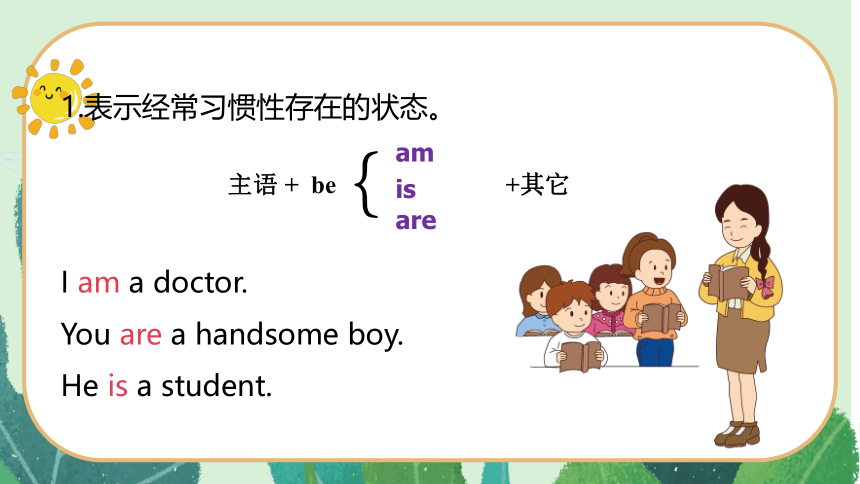
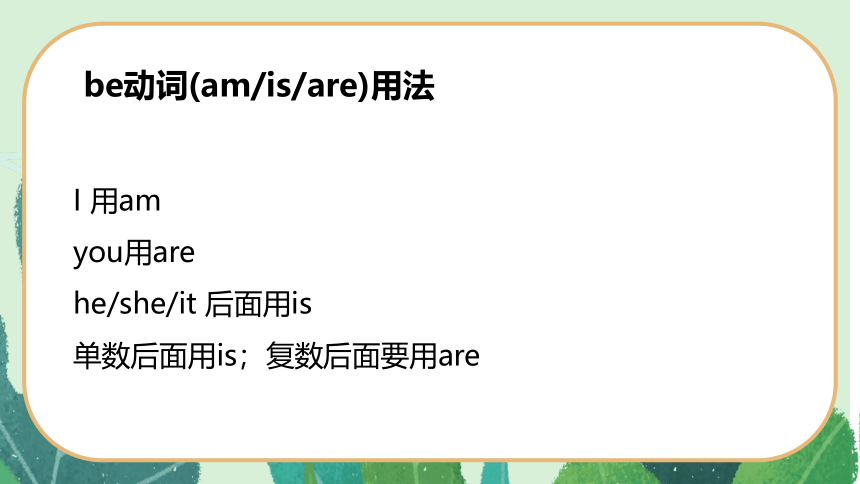
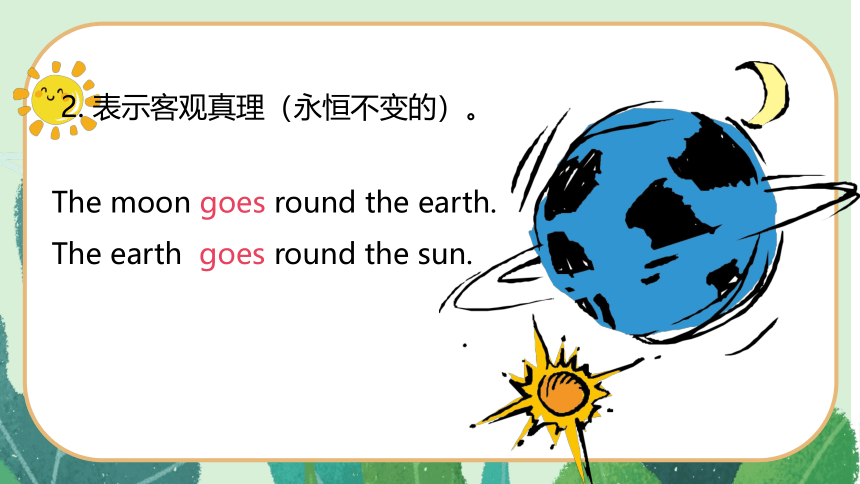
文档简介
一般现在时
Where is it?
Dear John, I am Betty Lin. I am eleven years old and I live in Wuhan. I like playing the piano. I like reading books. I get up at seven o'clock. I go to school at twenty to eight. School starts at quarter past eight. School ends at half past four. I go to bed at nine.Please write to me and tell me about your day.
Yours,
Betty
1.表示现在或是经常存在的状态。
I am Betty Lin.
I am eleven years old.
Dear John, I am Betty Lin. I am eleven years old and I live in Wuhan. I like playing the piano. I like reading books. I get up at seven o'clock. I go to school at twenty to eight. School starts at quarter past eight. School ends at half past four. I go to bed at nine.Please write to me and tell me about your day.
Yours,
Betty
2.表示主语具备的性格或是能力。
I like playing the piano.
I like reading books.
Dear John, I am Betty Lin. I am eleven years old and I live in Wuhan. I like playing the piano. I like reading books. I get up at seven o'clock. I go to school at twenty to eight. School starts at quarter past eight. School ends at half past four. I go to bed at nine.Please write to me and tell me about your day.
Yours,
Betty
3.表示经常发生的、习惯性的动作。
I live in Wuhan.
I get up at seven o'clock.
I go to school at twenty to eight.
School starts at quarter past eight.
School ends at half past four.
I go to bed at nine.
一般现在时
表示经常发生的、习惯性的动作或存在的状态。
1.表示经常习惯性存在的状态。
I am a doctor.
You are a handsome boy.
He is a student.
主语 + be +其它
{
am
is
are
be动词(am/is/are)用法
I 用am
you用are
he/she/it 后面用is
单数后面用is;复数后面要用are
2. 表示客观真理(永恒不变的)。
The moon goes round the earth.
The earth goes round the sun.
I live in Wuhan.
I get up at seven o'clock.
School starts at quarter past eight.
School ends at half past four.
3.表示经常性、习惯性的动作
01 主语不是三单
主语(非第三人称单数)+动词原形+其他
I often watch TV in the evening.
Amy and Sarah like playing football.
02 主语是三单
主语(第三人称单数)+动词的三单+其他
John usually goes shopping on Sundays.
Mike studies English every day.
哪些是第三人称单数(三单)?
凡是可以用he, she, it代替的单数名词。
比如:单个人名、地名或称呼。
?①Chen Jie looks like her mother.
?②Shanghai sits in China.
?③My mother often makes cakes.
三单
不是三单
you
his sister
Lucy's pen
Tom
I
your aunt
her brothers
实义动词第三人称单数的动词形式变化规则:
{5940675A-B579-460E-94D1-54222C63F5DA} 一般在词尾加 –s
work—works
swim --- swims
以字母 s,x,ch,sh 或 o 结尾的词加-es
teach --- teaches
do--- does
go--goes
以辅音字母加 y 结尾的词,变 y 为 i 再加-es
carry --- carries
fly --- flies
cry --- cries
特殊变化:
have(三单)has
have
直接加s
加es
改y为i加es
play
catch
cry
go
teach
1.We______________(play)on?the?playground?every?day.
2.She______________( get)up at 7 every Sunday.
3.You_______________(brush)your?teeth?every?morning.?
4.Tom?often?__________(study)English,Chinese,and?Maths?at?school.?
5.Linda's brother usually _______________(watch )TV with his grandparents.
play
gets
brush
studies
watches
一般现在时的句型转换
一般现在时句型转换----变否定
1.当句子里动词是be动词或情态动词时,在后面加not.
We are students.
She can swim.
We are not students.
She can not swim.
一般现在时句型转换----变否定
2.①当句子里动词是实义动词时,主语是非三单,
主语+don't+动词原形+其他
We??go??to??school??every??morning.
We don't go??to??school??every??morning.
一般现在时句型转换----变否定
2.②当句子里动词是实义动词时,主语是三单
主语+doesn't+动词原形+其他
He goes to school by bike.
He doesn't go to school by bike..
1.We________________ (not get)on?the?playground?
every?day.?
2.She______________ (not get)up?at?7?o’clock?
every?day.
?
3.You_______________ (not brush)your?teeth?
every?morning.?
4.Sam_________________(not study)English?every?day.
don't get
doesn't study
doesn't get
don't brush
一般现在时句型转换----变一般疑
1.当句子里动词是be动词或情态动词时,把它们提至句首。
She can swim.
Can she swim?
I am a girl.
Are you a girl?
一般现在时句型转换----变一般疑
2.①当句子里动词是实义动词时,主语是非三单,
Do+主语+动词原形+其他?
I often watch TV in the evening.
Do you often watch TV in the evening?
一般现在时句型转换----变一般疑
2.②当句子里动词是实义动词时,主语是三单
Does+主语+动词原形+其他?
John usually goes shopping on Sundays.
Does John usually go shopping on Sundays?
1.?Daniel??watches??TV??every??evening.(否定句)??
________________________________________________
2.?I?do?my??homework??every??day.(一般疑问句)??
________________________________________________
3.Amy?likes?playing?computer?games.(一般疑问句,并作否定回答)??
_________________________________________________?
Does Amy like playing computer games?
No , she doesn't.
Do you do your homework every day?
Daniel doesn't watch TV every evening.
一般现在时句型转换----变特殊疑
特殊疑问句=特殊疑问词+一般疑问句?
5.?I?play football with Peter in?the?park.(划线提问)?
______________________________________________________?????
6.?John?comes?from?Canada.(划线提问)
?____________________________________________________
What do you do in the park?
Where does John come from?
Where is it?
Dear John, I am Betty Lin. I am eleven years old and I live in Wuhan. I like playing the piano. I like reading books. I get up at seven o'clock. I go to school at twenty to eight. School starts at quarter past eight. School ends at half past four. I go to bed at nine.Please write to me and tell me about your day.
Yours,
Betty
1.表示现在或是经常存在的状态。
I am Betty Lin.
I am eleven years old.
Dear John, I am Betty Lin. I am eleven years old and I live in Wuhan. I like playing the piano. I like reading books. I get up at seven o'clock. I go to school at twenty to eight. School starts at quarter past eight. School ends at half past four. I go to bed at nine.Please write to me and tell me about your day.
Yours,
Betty
2.表示主语具备的性格或是能力。
I like playing the piano.
I like reading books.
Dear John, I am Betty Lin. I am eleven years old and I live in Wuhan. I like playing the piano. I like reading books. I get up at seven o'clock. I go to school at twenty to eight. School starts at quarter past eight. School ends at half past four. I go to bed at nine.Please write to me and tell me about your day.
Yours,
Betty
3.表示经常发生的、习惯性的动作。
I live in Wuhan.
I get up at seven o'clock.
I go to school at twenty to eight.
School starts at quarter past eight.
School ends at half past four.
I go to bed at nine.
一般现在时
表示经常发生的、习惯性的动作或存在的状态。
1.表示经常习惯性存在的状态。
I am a doctor.
You are a handsome boy.
He is a student.
主语 + be +其它
{
am
is
are
be动词(am/is/are)用法
I 用am
you用are
he/she/it 后面用is
单数后面用is;复数后面要用are
2. 表示客观真理(永恒不变的)。
The moon goes round the earth.
The earth goes round the sun.
I live in Wuhan.
I get up at seven o'clock.
School starts at quarter past eight.
School ends at half past four.
3.表示经常性、习惯性的动作
01 主语不是三单
主语(非第三人称单数)+动词原形+其他
I often watch TV in the evening.
Amy and Sarah like playing football.
02 主语是三单
主语(第三人称单数)+动词的三单+其他
John usually goes shopping on Sundays.
Mike studies English every day.
哪些是第三人称单数(三单)?
凡是可以用he, she, it代替的单数名词。
比如:单个人名、地名或称呼。
?①Chen Jie looks like her mother.
?②Shanghai sits in China.
?③My mother often makes cakes.
三单
不是三单
you
his sister
Lucy's pen
Tom
I
your aunt
her brothers
实义动词第三人称单数的动词形式变化规则:
{5940675A-B579-460E-94D1-54222C63F5DA} 一般在词尾加 –s
work—works
swim --- swims
以字母 s,x,ch,sh 或 o 结尾的词加-es
teach --- teaches
do--- does
go--goes
以辅音字母加 y 结尾的词,变 y 为 i 再加-es
carry --- carries
fly --- flies
cry --- cries
特殊变化:
have(三单)has
have
直接加s
加es
改y为i加es
play
catch
cry
go
teach
1.We______________(play)on?the?playground?every?day.
2.She______________( get)up at 7 every Sunday.
3.You_______________(brush)your?teeth?every?morning.?
4.Tom?often?__________(study)English,Chinese,and?Maths?at?school.?
5.Linda's brother usually _______________(watch )TV with his grandparents.
play
gets
brush
studies
watches
一般现在时的句型转换
一般现在时句型转换----变否定
1.当句子里动词是be动词或情态动词时,在后面加not.
We are students.
She can swim.
We are not students.
She can not swim.
一般现在时句型转换----变否定
2.①当句子里动词是实义动词时,主语是非三单,
主语+don't+动词原形+其他
We??go??to??school??every??morning.
We don't go??to??school??every??morning.
一般现在时句型转换----变否定
2.②当句子里动词是实义动词时,主语是三单
主语+doesn't+动词原形+其他
He goes to school by bike.
He doesn't go to school by bike..
1.We________________ (not get)on?the?playground?
every?day.?
2.She______________ (not get)up?at?7?o’clock?
every?day.
?
3.You_______________ (not brush)your?teeth?
every?morning.?
4.Sam_________________(not study)English?every?day.
don't get
doesn't study
doesn't get
don't brush
一般现在时句型转换----变一般疑
1.当句子里动词是be动词或情态动词时,把它们提至句首。
She can swim.
Can she swim?
I am a girl.
Are you a girl?
一般现在时句型转换----变一般疑
2.①当句子里动词是实义动词时,主语是非三单,
Do+主语+动词原形+其他?
I often watch TV in the evening.
Do you often watch TV in the evening?
一般现在时句型转换----变一般疑
2.②当句子里动词是实义动词时,主语是三单
Does+主语+动词原形+其他?
John usually goes shopping on Sundays.
Does John usually go shopping on Sundays?
1.?Daniel??watches??TV??every??evening.(否定句)??
________________________________________________
2.?I?do?my??homework??every??day.(一般疑问句)??
________________________________________________
3.Amy?likes?playing?computer?games.(一般疑问句,并作否定回答)??
_________________________________________________?
Does Amy like playing computer games?
No , she doesn't.
Do you do your homework every day?
Daniel doesn't watch TV every evening.
一般现在时句型转换----变特殊疑
特殊疑问句=特殊疑问词+一般疑问句?
5.?I?play football with Peter in?the?park.(划线提问)?
______________________________________________________?????
6.?John?comes?from?Canada.(划线提问)
?____________________________________________________
What do you do in the park?
Where does John come from?
